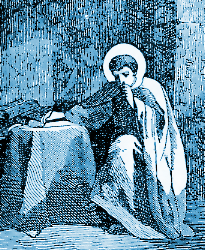Lives of the Saints
Our Models and Protectors
Spiritual Bouquet:
June 25

Saint Prosper of Aquitaine
Doctor of the Church
(† 5th century)
Saint Prosper was born in the Roman province of Aquitaine in the year 403. He is known chiefly through his writings, which reveal that in his youth he had applied himself to all branches both of sacred and secular learning. Because of the purity and sanctity of his manners, the writers of his time testify that he was a holy and venerable man. By his labors in France against the semi-Pelagian heretics, he was a strong collaborator of Saint Augustine in Africa. He was in correspondence with the African doctor, who wrote two of his works to refute and give light to the semi-Pelagians: On the predestination of the Saints and On the gift of perseverance. The enemies of Saint Augustine turned against Saint Prosper also, publishing fifteen errors which they attributed to the latter, then sixteen propositions supposedly clarifying Augustine's true sentiments, and spread them widely. The Saint with gentleness answered all these writings without acrid reprisals.
Saint Prosper, insofar as is known, was not an ecclesiastic; but being of great virtue and possessing extraordinary talents and learning, he dealt with delicate questions with remarkable insight. Saint Leo the Great, when chosen Pope in 440, invited him to Rome, made him his secretary, and employed him in the most important affairs of the Church. It was primarily Saint Prosper who finally crushed the Pelagian heresy definitively, when it was raising its head in the see of Peter. Its complete overthrow is said to be due to his zeal, learning, and unwearied endeavors. The date of his death remains uncertain, but he was still living in 455, the date at which his Chronicle concludes.
Les Petits Bollandistes: Vies des Saints, by Msgr. Paul Guérin (Bloud et Barral: Paris, 1882), Vol. 7; Little Pictorial Lives of the Saints, a compilation based on Butler's Lives of the Saints, and other sources by John Gilmary Shea (Benziger Brothers: New York, 1894).